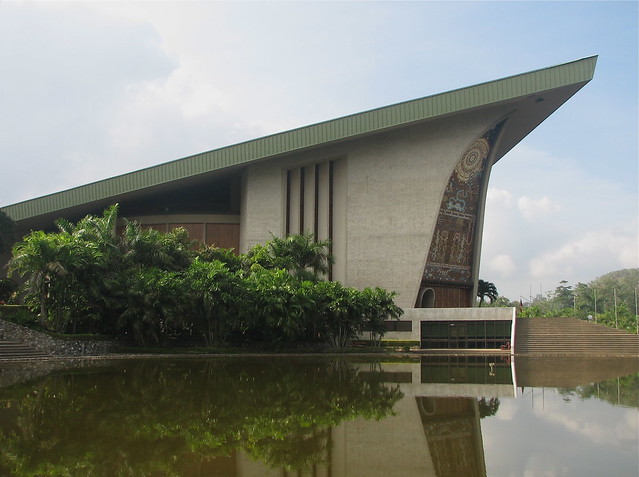The internal dimensions of sovereignty in the Pacific islands

The Australian government’s step-up in the Pacific islands is premised on the argument that the sovereignty of Pacific states needs safeguarding from Chinese strategic designs. But how should sovereignty be conceived? In State failure, sovereignty and effectiveness, Gerard Kreijen traces the historical usage of the concept, concluding that ‘external sovereignty or independence rests on internal sovereignty—the latter being a condition sine qua non for the former’.
The internal definitions of sovereignty matter in the Pacific islands—they aid the processes of identifying genuine threats and applying practical measures to address them. Pacific states are concerned with the internal aspects of sovereignty; that is, ‘the supreme power of the State to formulate and uphold the laws in respect of its population’. Enforcing domestic laws and regulating the negative effects of economic globalisation are immediate priorities in safeguarding the sovereignty of Pacific states.
The disruptive influences of non-state actors tax the limited capacities of states, undermine domestic agencies, and enrich the selfish impulses of local elites. When transnational criminal enterprises or unsavoury non-state actors are involved, they can easily erode the domestic capacities of states, enabling loopholes to be exploited unabated. The case of Papua New Guinea and its enforcement of immigration and labour laws is illuminating in this regard.
In May 2015, PNG parliamentarian Gary Juffa queried the minister for labor and industrial relations about a syndicate operating in the country. Juffa called on the government ‘to seriously consider re-engaging the Immigration taskforce, [the disbanded] Rausim Alien, … in light of a lot of serious issues concerning national security, such as illegal immigrants, foreigners breaching visa and work permit conditions and foreigners dominating reserves jobs’. The taskforce, in the brief period it was active, provided a sound model of interagency collaboration in law enforcement.
In 2012, the PNG National Executive Council authorised the establishment of what became known as Rausim Alien (‘rausim’ means ‘remove’ in pidgin). The taskforce was directed to ‘remove illegal non-citizens and non-citizens engaged in illegal or disreputable practices without delay’. It was mandated by government to ensure a coordinated approach to identifying and acting against unlawful and disreputable activities by non-citizens, and to work lawfully in fulfilling the national interest of PNG.
The PNG Immigration and Citizenship Service was charged with coordinating the activities of the taskforce in collaboration with six core agencies: the Department of Foreign Affairs, the Royal PNG Constabulary, the National Intelligence Organization, the Department of Labor and Industrial Relations, the Customs Service, and the Department of Justice and Attorney-General. These agencies were expected to participate in all taskforce meetings and contribute to its activities and operations. The Internal Revenue Commission, the Investment Promotion Authority, the National Fisheries Authority, the Standards and Censors Board, and the Office of the Public Prosecutor had ad hoc membership status in Rausim Alien.
Rausim Alien’s terms of reference outlined the activities and people who were subject to the taskforce’s scrutiny. An ‘illegal non-citizen’ was defined as ‘an individual who is unlawfully present in Papua New Guinea’. It included non-citizens who ‘overstayed the validity of a visa’ and individuals who entered PNG unlawfully. Non-citizens who participated knowingly in illegal activities and contravened PNG laws also fell into this category.
Rausim Alien uncovered illegal activities that were criminal (such as violent crimes, property crimes, crimes against women and children, production of pornography, and production and distribution of illegal drugs) or were administrative in nature (including working unlawfully in the country and conducting a business without appropriate approvals).
Through its operations, 14 foreign nationals identified as high risk and threats to the national security of PNG were promptly deported. In all, 156 foreigners were arrested for breaching various PNG laws.
During an operation in Goroka, Eastern Highlands, in 2013, a total of 35 foreign nationals were charged and convicted. The penalty fees on breaches of various PNG laws totalled K1.3 million. Other notable achievements included the arrest of seven public servants and 16 PNG citizens found to be harboring and aiding illegal foreign nationals. Rausim Alien also carried out investigations into a firearms-smuggling ring along the border regions of East and West Sepik provinces, uncovering high-powered semi-automatic rifles brought illegally into the country. Such incidents are indicative of the porous and unguarded borders of PNG.
The operations brought to light the serious transnational threats to PNG, especially human smuggling. Evidence from Rausim Alien suggests that operations involving international smuggling rings are now established in PNG. The taskforce demonstrated the urgency of PNG collaborating with regional governments to stem human-smuggling operations. Such activities also facilitate the trade in drugs and firearms. A worrying sign for law enforcement in PNG is that some Papua New Guineans are knowingly facilitating illegitimate activities.
For Pacific states, frontline agencies enforcing the laws of their countries stand to benefit from closer regional cooperation and coordination with other law-enforcement bodies in the Pacific. In the areas of immigration, labour, intellectual property rights, taxation, natural resources and consumer protection, Pacific states are faced with powerful and organised groups undermining their sovereignty. These are the vulnerable entry points for external threats to the stability of states in the Pacific.
While Pacific states want to attract foreign investors into the region, there are foreign non-state entities readily evading compliance with domestic laws. PNG’s Rausim Alien taskforce provides a template for interagency cooperation in thwarting corrupt forces undermining internal sovereignty. A regional approach to tackling transnational security threats to the domestic sovereignty of Pacific island states is an incentive for regional cooperation.
It’s timely that the Pacific Islands Forum’s Boe declaration emphasises ‘strengthening the existing regional security architecture inclusive of regional law enforcement secretariats and regional organisations’. It can be starting point in rethinking cooperation on regional security matters.